|
|
|
"The Boys of Summer"
1964
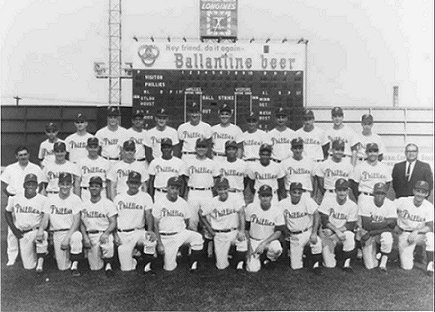 |

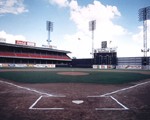 The pitching staff was led by Jim Bunning,an eventual Hall of Famer, who won 19 games with a 2.63 ERA and 219 strikeouts.
Offensive production was provided by "Rookie of the Year" Dick Allen, with 29 home runs, 201 hits, 91 RBI's and a .318 average. The fans flocked to 21st and Lehigh to see Johnny
Callison, Tony Gonzalez, Chris Short and Wes Covington. Old timers such as Cal McLish, Ed Roebuck, Bobby Shantz, Vic Power and Frank Thomas rounded out the roster. It was a great
year to be a Phillies fan, and an even better year to be a 13 year old, in love with his home town team. Watch out Yankees! The Phillies were coming!
The pitching staff was led by Jim Bunning,an eventual Hall of Famer, who won 19 games with a 2.63 ERA and 219 strikeouts.
Offensive production was provided by "Rookie of the Year" Dick Allen, with 29 home runs, 201 hits, 91 RBI's and a .318 average. The fans flocked to 21st and Lehigh to see Johnny
Callison, Tony Gonzalez, Chris Short and Wes Covington. Old timers such as Cal McLish, Ed Roebuck, Bobby Shantz, Vic Power and Frank Thomas rounded out the roster. It was a great
year to be a Phillies fan, and an even better year to be a 13 year old, in love with his home town team. Watch out Yankees! The Phillies were coming!
There were many great moments in the 64 season. One of the most memorable was Jim Bunning's FATHERS DAY "perfect game" against the Mets. 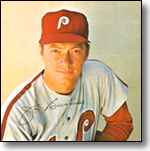 On June 21st Bunning
entered the record books and also became one of the few pitchers to toss no-hitters in both the American and National Leagues. Phillies fans can remember where they were when Bunning tossed this gem. It had been 42 years since a perfect game had been pitched in the major leagues; eighty four years in the National League. Bunning went on to win 19 games in the 64 season, totalling 89 wins in his two tours with the Phils. He was elected to the Baseball Hall of Fame in 1996. He is currently serving in the U.S. Senate as a Republican represenative from Kentucky.
On June 21st Bunning
entered the record books and also became one of the few pitchers to toss no-hitters in both the American and National Leagues. Phillies fans can remember where they were when Bunning tossed this gem. It had been 42 years since a perfect game had been pitched in the major leagues; eighty four years in the National League. Bunning went on to win 19 games in the 64 season, totalling 89 wins in his two tours with the Phils. He was elected to the Baseball Hall of Fame in 1996. He is currently serving in the U.S. Senate as a Republican represenative from Kentucky.
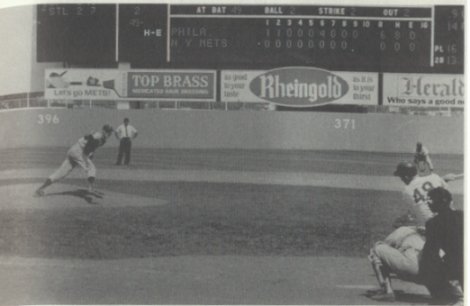 |
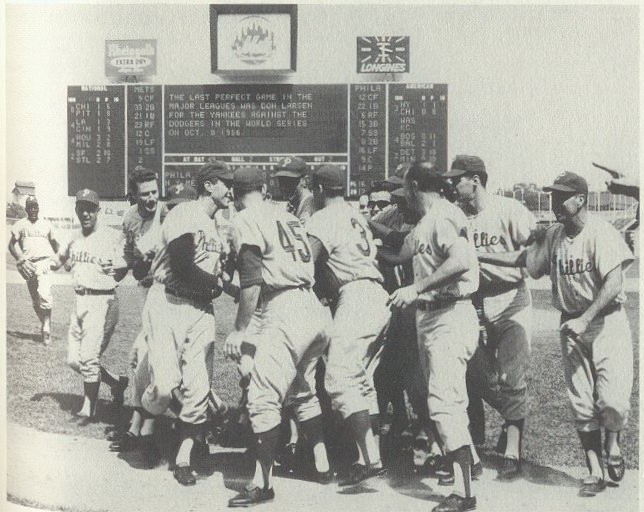 |
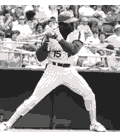 Hailing from Wampum, Pennsylvania, Allen proceeded to take the city by storm. A controversial player, in an age where players
were not supposed to be controversial, his career in Philly was stormy. He came to the city during the racially charged atmosphere of the 60's. He played every game at third base in 64, a position he had never played before. He was voted the "Rookie of the Year", and is remembered for his prodigious home runs and overall power. A celebrated fight with teammate Frank Thomas on 7-3-64 ended with Thomas being released by
the club. Many fans blamed Allen for the incident and never forgave him. Allen was switched to first base after the 64 season, and developed a habit of writing messages in the dirt around the infield. The fans reacted in a hostile manner, and some of these messages read "BOO" or "TRADE ME". He was ordered to stop the message writing by the National League office, and this only added to the controversy. It seemed inevitable that the "boo birds" were going to run Allen out of Philly. In 1966 he hit 40 home runs with 112 RBI's and a .317 average. He was traded to the Cardinals in 69 and later played with the Dodgers, White Sox and Oakland. He returned to the Phils for the 1975 and 1976 seasons. He finished his career with 351 home runs and a .292 batting average. He is a frequent and popular guest
at Philadelphia area autograph and memorabilia shows. Chuck Brodsky, a popular folk singer and Philly native, immortalized him in his "Letters in the Dirt" song, which thanks his father for allowing him his heroes and echos the sentiments of true Philly fans of the 60's.
Hailing from Wampum, Pennsylvania, Allen proceeded to take the city by storm. A controversial player, in an age where players
were not supposed to be controversial, his career in Philly was stormy. He came to the city during the racially charged atmosphere of the 60's. He played every game at third base in 64, a position he had never played before. He was voted the "Rookie of the Year", and is remembered for his prodigious home runs and overall power. A celebrated fight with teammate Frank Thomas on 7-3-64 ended with Thomas being released by
the club. Many fans blamed Allen for the incident and never forgave him. Allen was switched to first base after the 64 season, and developed a habit of writing messages in the dirt around the infield. The fans reacted in a hostile manner, and some of these messages read "BOO" or "TRADE ME". He was ordered to stop the message writing by the National League office, and this only added to the controversy. It seemed inevitable that the "boo birds" were going to run Allen out of Philly. In 1966 he hit 40 home runs with 112 RBI's and a .317 average. He was traded to the Cardinals in 69 and later played with the Dodgers, White Sox and Oakland. He returned to the Phils for the 1975 and 1976 seasons. He finished his career with 351 home runs and a .292 batting average. He is a frequent and popular guest
at Philadelphia area autograph and memorabilia shows. Chuck Brodsky, a popular folk singer and Philly native, immortalized him in his "Letters in the Dirt" song, which thanks his father for allowing him his heroes and echos the sentiments of true Philly fans of the 60's.
The Phillies sent Jim Bunning, Chris Short and Johnny Callison to the All Star game in July.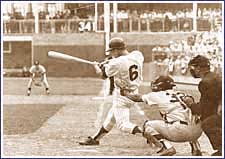 Callison rose to the occasion with a ninth inning game winning three run homer for the National League. Hit off Red Sox hurler Dick Radatz, the ball sailed far into the right field stands. Callison finished the season with 31 home runs and 104 RBI's. He finished second in MVP voting to
the Cardinals Ken Boyer. He hit 226 home runs in his ten years with the Phils. He finished first in the voting for "Rowhouse Hero" of every baseball inspired male in Philadelphia that summer.
Callison rose to the occasion with a ninth inning game winning three run homer for the National League. Hit off Red Sox hurler Dick Radatz, the ball sailed far into the right field stands. Callison finished the season with 31 home runs and 104 RBI's. He finished second in MVP voting to
the Cardinals Ken Boyer. He hit 226 home runs in his ten years with the Phils. He finished first in the voting for "Rowhouse Hero" of every baseball inspired male in Philadelphia that summer.
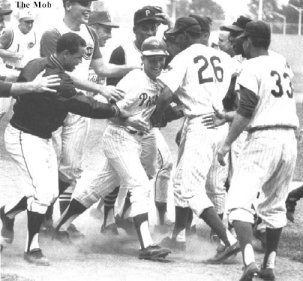
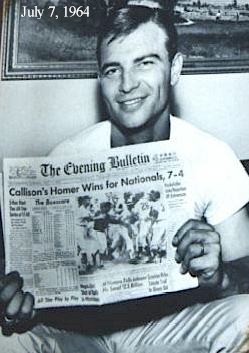
(The Pics were "borrowed" from Rick, Johnny's "biggest fan")
Once the All Star game was over the Phillies got back to the serious business of winning the National League Pennant. Everything was going their way, and after 150 games were played they had a six and a half game lead, and the team announced World Series tickets were going on sale. Philadelphia would
be hosting its first series since 1950. The Phillies lost that series to the Yanks and also lost their only previous attempt to Babe Ruth and the Red Sox in 1915. Any Philly school boy could tell you that this was going to be the year of Gonzalez, Mahaffey, Bunning and Short. Bunning and Short? hmmmmmm!
Tony Gonzalez Art Mahaffey Chris Short
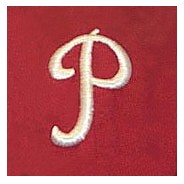 A strange and traumatic world was only softened by the realization that the Phillies were going to win the pennant. They were the talk of the city. Phillies
placards graced the sides of every bus and trolley car in town! Phillies baseball cards were quickly removed from bicycle spokes, and my previous Mickey Mantle "for anybody
in a Phils uniform" card trades were becoming a shining example of my future financial savvy. In short, we were on top of the world. Nothing to do now but schedule the clinching party
and wait for the first pitch of the series. A happy town awoke on the morning of September 21st, the Phils had a six and a half game lead, and the magic number was 7. Little were we to know however,
there was a "darkness on the edge of town"! Every Phillies fan of the 60's recalls this day of infamy.
A strange and traumatic world was only softened by the realization that the Phillies were going to win the pennant. They were the talk of the city. Phillies
placards graced the sides of every bus and trolley car in town! Phillies baseball cards were quickly removed from bicycle spokes, and my previous Mickey Mantle "for anybody
in a Phils uniform" card trades were becoming a shining example of my future financial savvy. In short, we were on top of the world. Nothing to do now but schedule the clinching party
and wait for the first pitch of the series. A happy town awoke on the morning of September 21st, the Phils had a six and a half game lead, and the magic number was 7. Little were we to know however,
there was a "darkness on the edge of town"! Every Phillies fan of the 60's recalls this day of infamy.
9-22-64 Short is pounded by the Reds! Phils lose 9-2
9-23-64 Reds Pinson homers twice off Dennis Bennett! Phils lose 6-4
9-24-64 Braves Joe Torre has 3 RBI's vs. Bunning! Phils lose 5-3
9-25-64 John Boozer beaten by Braves in 12th! Phils lose 7-5
9-26-64 Braves Rico Carty triples in ninth off Shantz! Phils lose 6-4
9-27-64 Callison's three homers can't outdo Braves! Phils lose 14-8
9-28-64 Card's Gibson outpitches Short! Phils lose 5-1
9-29-64 Card's Sadecki tops Dennis Bennett! Phils lose 4-2
9-30-64 Former Phil Curt Simmons outpitches Bunning! Phils lose 8-5
On Oct 2nd and 3rd they won, behind the pitching of Roebuck and Bunning; Bunnings' victory being a 10-0 shutout on the last day of the season.
They finished second, tied with Cincinnati, while St. Louis took the Pennant. 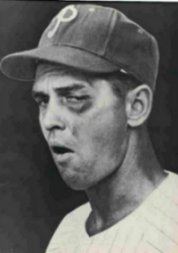 Hopes were shattered and the heart of the city was broken. A crowd of 8,000 fans did
turn out at Philly International Airport to welcome the team home and thank them for an exciting season. It would be a dismal fall. The Phillies
would not appear in the series until 1980, sixteen years later. Thankfully, that year produced a much happier outcome. Philadelphia was (and is) a city where fans are not surprised by losing teams. Some of the
worst teams in history wore P's or A's on their shirts. The Phillies have lost more games in the 20th century than any other major league franchise. Old wounds may never heal, but Phllies fans still have
a place reserved in their hearts for the "1964 Phils", THE TEAM THAT ALMOST WAS! Any "filladelfian" would understand pausing here for a moment of silence while the names are read!
Hopes were shattered and the heart of the city was broken. A crowd of 8,000 fans did
turn out at Philly International Airport to welcome the team home and thank them for an exciting season. It would be a dismal fall. The Phillies
would not appear in the series until 1980, sixteen years later. Thankfully, that year produced a much happier outcome. Philadelphia was (and is) a city where fans are not surprised by losing teams. Some of the
worst teams in history wore P's or A's on their shirts. The Phillies have lost more games in the 20th century than any other major league franchise. Old wounds may never heal, but Phllies fans still have
a place reserved in their hearts for the "1964 Phils", THE TEAM THAT ALMOST WAS! Any "filladelfian" would understand pausing here for a moment of silence while the names are read!
Jack Baldschun, Dave Bennett, Dennis Bennett, John Boozer, Jim Bunning, Ray Culp,
Ryne Duren, Dallas Green, Johnny Klippstein, Gary Kroll, Bobby Locke, Art Mahaffey, Cal McLish,
Ed Roebuck, Bobby Shantz, Chris Short, Morrie Steevens, Rick Wise, Dick Allen, Ruben Amaro, Johnny Briggs, Johnny Callison, Danny Cater, Pat Corrales, Wes Covington, Clay Dalrymple,
Tony Gonzalez, Johnny Herrnstein, Don Hoak, Alex Johnson, Adolfo Phillips, Vic Power, Cookie Rojas, Costen Shockley, Roy Sievers, Tony Taylor, Frank Thomas, Gus Triandos, Bobby Wine and Gene Mauch.

